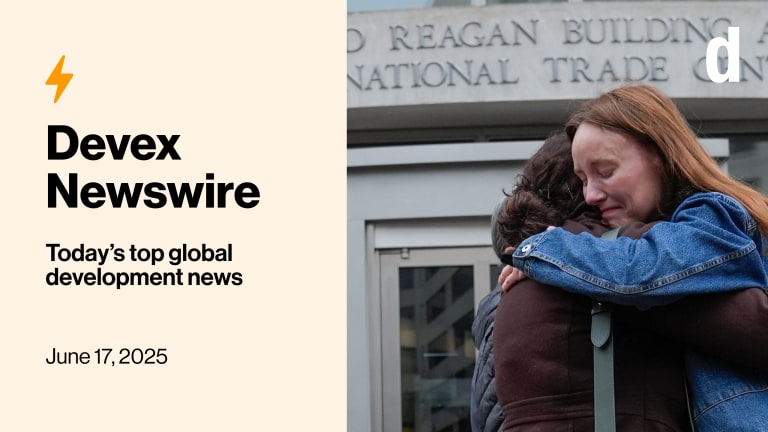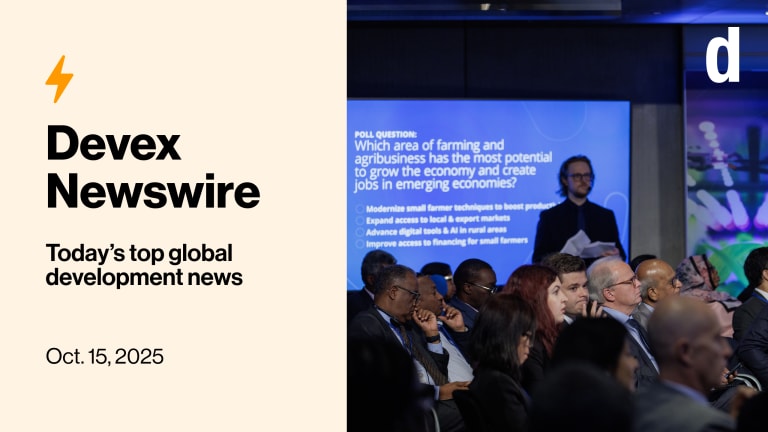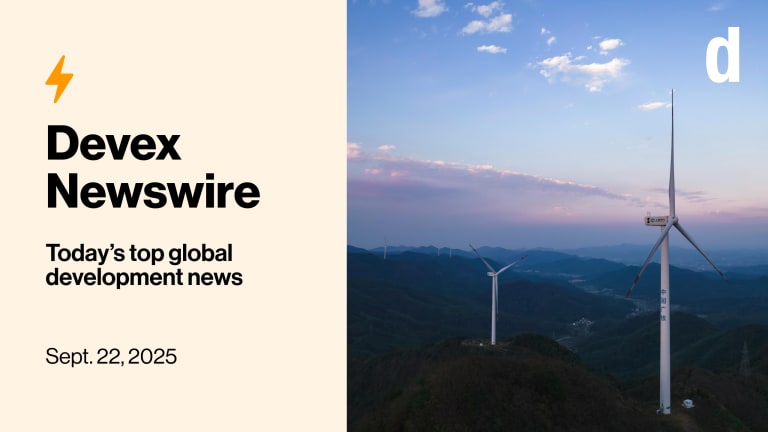
When Ajay Banga took over the reins at the World Bank last June, he promised to ramp up the multilateral lender’s work on climate. But 12 months on, has the president delivered?
Also in today’s edition: U.N. secretary-general calls for a ban on fossil fuel advertising, and trouble for funding development in the U.S. House of Representatives and Department of State
This is a preview of Newswire
Sign up to this newsletter for an inside look at the biggest stories in global development, in your inbox daily.
Upcoming event: The U.K. will be heading to the polls in a month’s time. What’s at stake for aid, and how will the eventual winner fit development within its broader foreign policy? Join us and a panel of experts on June 12 to dig into what each party is offering and how much remains unknown. Save your spot now.
The green zone
Ajay Banga talks a lot about climate. One of the World Bank president’s first moves upon entering the top job was to introduce a new climate-oriented vision statement for the bank, one centered on creating a poverty-free world on a livable planet. Soon after, he committed to spending 45% of the bank’s annual financing on climate-related projects — up 10% from the previous year — and announced a 2030 plan to provide affordable electricity to 250 million people across Africa.
Despite that, one year into Banga’s stint at the bank, some civil society groups are unhappy — especially those who want the World Bank to stop investing in climate-harming fossil fuels and methane-emitting industrial livestock, Devex contributor Sophie Edwards tells me
Though the bank’s fossil fuel investment figures are low — before Banga joined, it had allocated $170 million to natural gas out of $122 billion committed overall — civil society groups have questioned those figures, stating the true fossil fuel investment figure could be as high as $885 million.
“Banga should walk the talk by cleaning up the World Bank’s own act and encouraging other financing actors, over which it has influence, to follow suit,” Erich Pica, president of Friends of the Earth, said during a recent online press conference.
Read: World Bank chief Ajay Banga's one-year climate report card (Pro)
ICYMI: World Bank's Ajay Banga on climate — 'My grandchild's time is running out'
+ A Devex Pro membership lets you access all our exclusive reporting and analyses, members-only events, the world’s largest development job board, and a special weekly newsletter covering globaldev top job moves. Not yet gone Pro? Start your 15-day free trial today.
Coal’d rejection
Banga isn’t the only one feeling the heat. United Nations chief António Guterres urged countries to ban fossil fuel advertising for the first time in history on Wednesday.
“Fossil fuels are not only poisoning our planet — they’re toxic for your brand,” he said. “Many in the fossil fuel industry have shamelessly greenwashed, even as they have sought to delay climate action — with lobbying, legal threats, and massive ad campaigns.”
The secretary-general’s demands were delivered at a press conference to mark World Environment Day in New York City yesterday, Stéphanie Fillion reports for Devex. It was an attempt to get governments and private companies to approach the issue the same way they did tobacco industry advertising, and to follow in the footsteps of those who have already done so, albeit only in part: Amsterdam and France.
Still, it’s a big trend to buck. Fossil fuel trade associations spent $1.4 billion on public relations and advertising between 2008 and 2017 in the United States alone, a study from the Climate Investigations Center found.
“Money talks. It must be a voice for change,” Guterres said.
Read: UN leader makes unprecedented call to ban fossil fuel advertising
Opinion: To make health a global priority, move away from fossil fuels
+ Can you ace our five-item quiz on May's most-read globaldev news? Let’s see how well you do!
Trouble in the chamber
Different ideas are swirling in the Republican-led U.S. House of Representatives, whose latest foreign affairs funding bill has been called either “disastrous,” or fiscally prudent, depending on who you ask.
But by proposing a 2025 foreign affairs budget that would cut funding by 11% compared to this year — and wind up as 19% less than what U.S. President Joe Biden requested — it’s clear a few sectors will bear the brunt of the slashes: climate change, U.N. agencies, and humanitarian aid.
Though unlikely to pass in its current form, the bill introduced this week and approved by the subcommittee on Tuesday indicates Republican priorities for foreign affairs, my colleague Adva Saldinger reports.
“The message of this bill is more weapons and less cooperation,” said Rep. Barbara Lee, the top Democrat on the subcommittee. She pointed to an increase in military financing and a prohibition on funding for many U.N. agencies. The bill “repeats many of the bad ideas of last year’s and then doubles down with some new ones” she said at a markup hearing about the budget, adding that she hopes the deficiencies in the proposal can be addressed as the budget process continues.
“It would be disastrous to go forward as it is currently written,” she said.
Adva pored over the bill, and found millions of dollars in cuts — affecting operating expenses for USAID, slashes to global health and development assistance, and more. It also puts a number of priorities set by the Biden administration in the crosshairs, with climate top of the hit list. Among other restrictions, the bill would forbid funds to implement the Paris climate agreement or several climate-related executive orders, including guidance on fossil fuel energy at multilateral development banks.
Read: 'Damaging' foreign affairs budget cuts funding, fuels partisan politics
ICYMI: Budget constraints limit foreign affairs funding in Biden proposal (Pro)
Related: The US foreign aid budget process explained
Fugue state
The U.S. State Department is also feeling the heat in a way that’s just as complex and partisan: In a hearing with former State Department officials on Tuesday, Republican lawmakers repeatedly cherry-picked individual grants that they find objectionable, painting the U.S. government’s entire approach to foreign assistance as wasteful and counterproductive, my colleague Michael Igoe tells me.
“Those programs — sometimes, not always, in fact not most of the time — poison bilateral relations with other countries with incessant demands and funding for internal political change and cultural change,” said Robert Destro, who served as assistant secretary of state under former President Donald Trump, at the hearing.
While Republicans called out certain grants they objected to — a canceled drag show in Ecuador, and support for religious nonbelievers in Nepal — Democrats argued that the U.S. government’s human rights grants are critical to pushing democracy forward.
Read: U.S. lawmakers spar over human rights funding, transparency
+ Catch up on all the news and analysis on the U.S. development sector.
Digging it
A U.S.-backed initiative to build climate-resilient food systems in Africa is now expanding to Central America, bringing a focus on indigenous crops — and healthier soils — to Guatemala.
“Through this program, we can reach farmers in areas that have been missed,” Guatemalan Agriculture Minister Maynor Estrada told me, speaking through a translator on Monday night.
And for Estrada, new efforts to tackle agricultural challenges in Guatemala can’t come soon enough. The region’s Dry Corridor — a strip of land stretching from El Salvador through Guatemala to Honduras and Nicaragua — has long been vulnerable to both drought and erratic rainfall, a combination that often devastates crops throughout the region.
“Guatemala is facing a number of food security challenges,” said Cary Fowler, the U.S. special envoy for global food security. “It’s a humanitarian crisis, but it’s also an economic and developmental crisis, because a country can’t really develop with that kind of problem facing upcoming generations.”
Read: A US-led initiative to climate-proof crops heads to Central America
+ For more content like this, sign up to Devex Dish, a weekly newsletter on the transformation of the global food system.
In other news
An estimated 440 million children under 5 years old in low- and middle-income countries experience food poverty, with 181 million of those living in severe food poverty, according to UNICEF. [France 24]
An Israeli military strike targeting a U.N. school at the Nuseirat refugee camp in Gaza has killed at least 27 people. [BBC]
The World Health Organization announced on Wednesday that a person who was the first laboratory-confirmed case of the H5N2 virus, a subtype of bird flu, died from prior health complications in April in Mexico. [Reuters]
Sign up to Newswire for an inside look at the biggest stories in global development.








